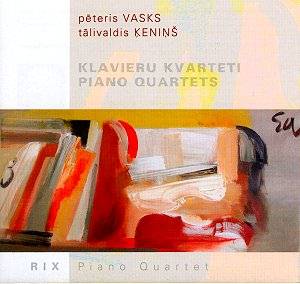Pēteris
Vasks was born in Aizpute in Latvia. He studied with Valentins
Utkins (1974-78). His 'articles of faith' (or a portion of them)
are framed in the excellent liner notes where he says: "Speaking
Latvian in one's music might be the most important and essential
message we should carry to the world ... telling everything in
our language ... even if people had no contact with Latvian music
- if they see some peculiar colour, some flavour that is not to
be found anywhere else we have been on the right track - we have
been communicating in Latvian." In a world increasingly US English
dominant across every medium we should value such national voices
which break the bonds of an international conformity. Enhanced
communications are said to create a heaving cauldron of cultural
voices whether musical or linguistic. The tendency is for the
predatory genes of World-English to dilute and render bland what
is distinctive and different rather than supporting a diverse
culture. In Vasks’ case his voice speaks for a world of 'otherness'
which can yet draw us back from the vortex of a boring planetary
conformity.
Vasks
instantly ushers us into his primal world unspoilt by the
tired or the vile or the crass. His music is unfailingly melodic,
with strong clean folk ‘strata’, viscerally rhythmic, impetuously
explosive. This much is very clear from his Piano Quartet which
migrates through passages which are familiar if we know Sibelius
6, Holst's Four Medieval Songs, Stravinsky’s Petrushka
and, yes, Vivaldi's Four Seasons. At the close of the
Danze movement and the start of Quasi una passacaglia
Vasks' free immersion in stimulatingly dissonant music suggests
some influence from Schnittke (interestingly Vasks has been composer
in residence at Gidon Kremer's Lockenhaus Festival - Kremer being
a long-time supporter of Schnittke’s music). The soloistic cello
and violin lines in Canti drammatici each recall the grimmer
passages in the Second Cello Concertos of Schnittke and Kabalevsky.
Tender yet vibrant lyrical statements also surface like the long
melody taken by the violin in Canto principiale (tr.5 2.30).
This floats blessedly free accompanied by the benediction of the
piano. Its long-breathed quality recalls the melodic stamina of
John Foulds' rather 'modern' cello sonata (1905). The Canto
rises with healing light like a seraphic fusion between Barber's
Adagio and Pettersson's Seventh Symphony. The Postludio
looks out on a seared landscape - bleak by comparison with the
Canto. A spiritual tenderness pervades the Postludio
finale from 2.02 onwards.
The
big piano quartet is in six movements: Preludio, Danze,
Canti Drammatici, Quasi una passacaglia, Canto
principiale, Postludio.
Ķeniņš'
First Piano Quartet, written 43 years before the Vasks work,
is lyrical without recourse to the excoriating extremes of
the Vasks work. There is a chilly vitality in Ķeniņš’
writing. His use of dissonance is not as distant as Vasks' but
it is there, dusted over piano writing that sometimes sounds like
Nights in the Gardens of Toronto or Liepāja.
The string writing is denser and more sombre than that of Vasks
- though extremely appealing as in the concentrated sorrowing
solo violin song that surges out at 5.01 in the long first movement
moderato e espressivo. Ķeniņš creates a
lichen-hung effect in the Largo sostenuto - coasting very
close to the Frank Bridge Second Piano Trio. Only in the glittering
life of the Vivace e marcato finale does Shostakovich seem
briefly to raise his head … scorching and unmistakable. This work
was first performed in its year of composition at the American
Latvian Song festival.
Ķeniņš
was born in Liepāja, Latvia and studied at the Latvian Conservatory
during the Second World War. He worked with Messiaen and Tony
Aubin (1945-51) in Paris then went to Canada where he held professorships
at the Toronto University (1952-84). He has eight symphonies to
his name as well as twelve concertos and much chamber and vocal
music.
Two
Latvian piano quartets. One brilliant but bearing the sombre cargo
of the last century; the other alive with Latvian folk elements
and rhythmic vitality.
Rob Barnett
